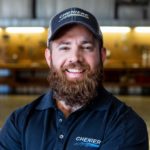Your Questions About Natural Gas, Answered
Natural gas is powering our modern way of life and helping to cut CO2 emissions. Here’s what this energy revolution is all about.
Learn MoreNatural gas is powering our modern way of life and helping to cut CO2 emissions. Here’s what this energy revolution is all about.
Learn More
Tyler Pedersen
Supervisor, Pipeline and Midstream Reliability Services, Cheniere
Bell City, LA
Tyler Pedersen ensures natural gas is transported safely so it can be exported around the world

February 11, 2020
Just a decade ago, the U.S. seemed to be running out of natural gas. Gas prices were high, and most American electricity came from coal. Companies started building natural gas import facilities to ensure a steady supply of affordable and efficient power and heat for American consumers and businesses.
Then came an energy revolution.
Advances in hydraulic fracturing and horizontal drilling pushed progress forward, enabling the nation to access natural gas and oil trapped in shale and other tight rock formations, instead of importing it.
Today, an abundance of U.S. natural gas heats our homes, keeps the lights on, and benefits the rest of the world as well. In 2017, the U.S. became a net natural gas exporter for the first time since 1957, a development that has helped friends and allies, grown trade and supported energy jobs here at home.
The construction of new infrastructure to export liquefied natural gas (LNG) has played a big part in our energy success story, and American workers keep that investment safe.
Chevron’s Marisa Ruffolo and her colleagues work tirelessly to thwart cyber foes attacking an essential American industry.
Learn more.Tyler Pedersen is one of those people. In rural Bell City, Louisiana, 30 miles north of the Gulf of Mexico, he supervises pipeline and midstream reliability services for Cheniere energy, the top U.S. producer of LNG.
Infrastructure drives dependability
Pedersen and his team monitor and maintain pipelines leading to one of the company’s export terminals in southwest Louisiana so that the natural gas moves safely and efficiently. “Proper construction and ongoing maintenance drive dependability,” he says. “Our ability to proactively maintain pipelines absolutely positions the American energy industry as one of the most efficient and reliable in the world.”
Providing energy on schedule takes a lot of work, and digital tools are key. The entire system of public and private pipelines is mapped out with GPS technology, which means Pedersen can use an aerial application to pinpoint exactly where to focus his attention. He and his team use thousands of operating data points to quickly analyze pipeline performance and enable Cheniere to more efficiently use its crews in the field.
Pipeline surveillance is just one way Cheniere works hard to ensure the safety of its employees and the surrounding environment. When filling tankers with LNG, massive ships are attached to the terminal with a loading arm that can automatically close and quickly detach from the vessel if necessary. Many LNG tankers are themselves powered by natural gas, which can reduce the ship’s greenhouse gas emissions by more than 20%.
Emissions down, exports up
Increased access to natural gas for electricity generation is the main reason U.S. carbon dioxide emissions are at the lowest level in a generation. And use of this cleaner energy source continues to grow.
“Manufacturers see an abundant, clean energy source and are figuring out ways to make this fuel user-friendly for the trucking and shipping companies,” Pedersen says.
Just as important, exporting more natural gas to other nations could help them reduce their emissions, too. The U.S. has exported LNG cargoes to more than 35 countries, spanning every region of the world.
“We are very lucky to live in a politically and economically stable country that is rich in resources, like natural gas. Not everyone does,” Pedersen says. “I’m honestly proud to be part of an industry that’s having a global impact — making the world a more secure and clean place to live.”
America’s place as an energy superpower continues to grow. The U.S. is projected to become the world’s largest LNG exporter in the world by 2022. Cheniere and other LNG exporters are blazing the trail, Pedersen says, and he’s happy to be a part of it. “Being at the forefront of a rapidly expanding industry happens once in a lifetime, if you’re lucky,” he says.
More From API
Read on for in-depth articles about how we’re securing America’s energy future, our efforts to combat climate change, and more.
She’s looking to improve the world anyway she can
Learn MoreNew tech is revolutionizing the natural gas and oil industry
Learn MoreCoterra Engineer Zach Conrad explains how the natural gas revolution is benefiting his hometown
Learn MoreWe use cookies to offer you a better browsing experience, analyze site traffic, personalize content, and serve targeted advertisements. If you continue to use this site, you consent to the use of cookies. Read more about our Privacy Policy and Terms and Conditions.
accept